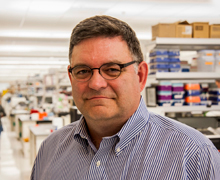Genotyping and Treatment of Lymphatic and Vascular Malformations
Applying cell-free DNA testing to precision diagnosis and personalized medicine for congenital disorders
Technology Overview
 Dr. Jonathan Perkins
Dr. Jonathan Perkins
Vascular malformations are anomalies of blood and lymphatic vessels that result in nonmalignant, swollen, fluid-filled masses. These malformations are usually caused by sporadic somatic mutations, leading to mosaicism in which a patient has some cells with and some without the mutation. Genetic testing of children and infants with vascular malformations is critical for making a specific diagnosis for treatment planning. Several genes associated with these conditions are well characterized, including activating mutations in the PI3K-MTOR and RAS-PIK3CA pathways, and TEK, MAP2K1, BRAF, and KRAS genes. Drugs that target the products of these genes include sirolimus (MTOR), alpelisib (PI3K), and miransertib (AKT). However, the mosaic pattern of the mutations means that genotyping for vascular malformations requires specialized surgery to obtain affected tissue from children or infants.
Dr. Perkins and clinical geneticist Dr. James Bennett developed a liquid-biopsy cell-free DNA (cfDNA) test for genotyping vascular malformations and other mosaic conditions using samples obtained without surgery. The high-throughput, high-sensitivity test uses multiplexed droplet digital PCR, similar to established cfDNA assays for cancer. Potential applications include diagnosis for treatment planning and monitoring response to treatment. Seattle Children’s Hospital has a CLIA-certified laboratory, VANSeq, for running molecular diagnostic tests such as cfDNA assays to determine eligibility for managed access programs and clinical trials for drugs targeted to patients’ specific causal mutations. Dr. Perkins is the lead Seattle Children’s investigator on industry-sponsored trials of miransertib for efficacy, safety, and impact on quality of life for patients with lymphatic malformations.
Dr. Perkins and colleagues contributed to identifying mutations that contribute to lymphatic malformation including in PIK3CA, which is responsible for approximately 80% of lymphatic malformations. The drug sirolimus targets this pathway.
Dr. Perkins directs the Vascular Anomalies program at Seattle Children’s Hospital. The program has multidisciplinary expertise in treating vascular anomalies and can enroll large pediatric cohorts from a broad region, for example to test the efficacy of PI3K/AKT/mTOR inhibition therapies on lymphatic malformations. The team includes experts in genetics, surgery, otolaryngology, craniofacial, hematology/oncology, and radiology; maintains a longitudinal registry of clinical and genetic information on patients; and has developed methods to evaluate treatment effectiveness, including a quality of life survey for patients with lymphatic malformations.
Dr. Perkins is interested in industry partnerships to develop cfDNA testing for congenital disorders. He is interested in collaborating on clinical trials for personalized treatments for vascular malformations.
Stage of Development
-
Preclinical in vitro
Partnering Opportunities
- Collaborative research opportunity
- High-throughput genetic testing development
- Sponsored research agreement
- Consultation agreement
- Tissue sample access
- Clinical trial development
Publications
- Zenner K, Jensen DM, Cook TT, Dmyterko V, Bly RA, Ganti S, Mirzaa GM, Dobyns WB, Perkins JA, Bennett JT. Cell-free DNA as a diagnostic analyte for molecular diagnosis of vascular malformations. Genet Med. 2020;In press.
- Wenger TL, Bly RA, Wu N, Albert CM, Park J, Shieh J...Perkins JA...et al...Activating variants in PDGFRB result in a spectrum of disorders responsive to imatinib monotherapy. Am J Med Genet A. 2020;182(7):1576-1591.
- Li D, March ME, Gutierrez-Uzquiza A, Kao C, Seiler C...Perkins JA...et al...ARAF recurrent mutation causes central conducting lymphatic anomaly treatable with a MEK inhibitor. Nat Med. 2019;25(7):1116-1122.
- Zenner K, Cheng CV, Jensen DM, Timms AE, Shivaram G, Bly R, Ganti S, Whitlock KB, Dobyns WB, Perkins J, Bennett JT. Genotype correlates with clinical severity in PIK3CA-associated lymphatic malformations. JCI Insight. 2019;4(21):e129884.
- Piacitelli AM, Jensen DM, Brandling-Bennett H, Gray MM, Batra M, Gust J...Perkins J, Mirzaa GM, Bennett JT. Characterization of a severe case of PIK3CA-related overgrowth at autopsy by droplet digital PCR and report of PIK3CA sequencing in 22 patients. Am J Med Genet A. 2018;176(11):2301-2308.
Learn More
To learn more about partnering with Seattle Children’s Research Institute on this or other projects, email the Office of Science-Industry Partnerships.